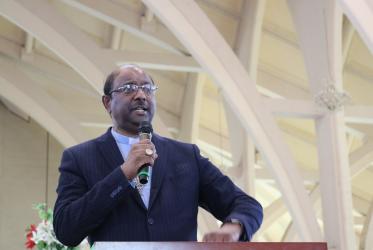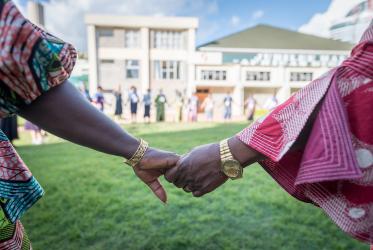The church leaders who gathered on 24 June as part of the ongoing WCC central committee meeting observed that Africa still faces challenges of political unrest, corruption, poverty, food insecurity and vaccine inequality, particularly in the context of COVID-19. “Africa is wounded and so are the churches. We are torn by wars, all kinds of violence and corruption”. Said Rev. Festus Ambe Asana, of the Presbyterian Church in Cameroon.
Despite these challenges, the church in Africa has remained resilient, been a wounded healer, and seen as the last hope in addressing these challenges.
Said Elisama Wani Daniel, of the Province of the Episcopal Church of South Sudan, “For years, South Sudan has experienced numerous conflicts and the church has been on the receiving end. Yet in the midst of it all, the church has stood firm. It continues to be immersed in its Biblical role and working out its part to mediate, reconcile, heal, unite people and nation and make durable and just peace.”
“For Christ's love, in love and through love, the United Church of Zambia has given witness, done her mission and served the Zambian community and beyond since union in 1965. As a union, the church has been a shining expression of reconciliation of the divisions that were exhibited by the missionary societies and churches that came to Zambia during the missionary era and we daily stand out as a symbol of unity within and out with Zambia,” said Rev. Silishebo Silishebo, of the United Church of Zambia.
For the church to be able to influence African governments and the community to live the upcoming WCC assembly theme, it must allow itself to be first transformed by the theme. The church leaders challenged each other to set a good example to their members and their governments.
“For 19 years, the Methodist Protestant Church of Benin experienced divisions, but in 2017, we allowed God’s love to unify the two warring factors in the church. This unity has now allowed the church to address injustices, development and social economic issues affecting the people of Benin and hold our government accountable,” said Eliane Kuadjo, of the Methodist Protestant Church of Benin.
Going forward, the leaders agreed to undertake further reflection on what the theme means to the people and churches in Africa. This will include revisiting the report of the WCC 8th Assembly in Harare.






